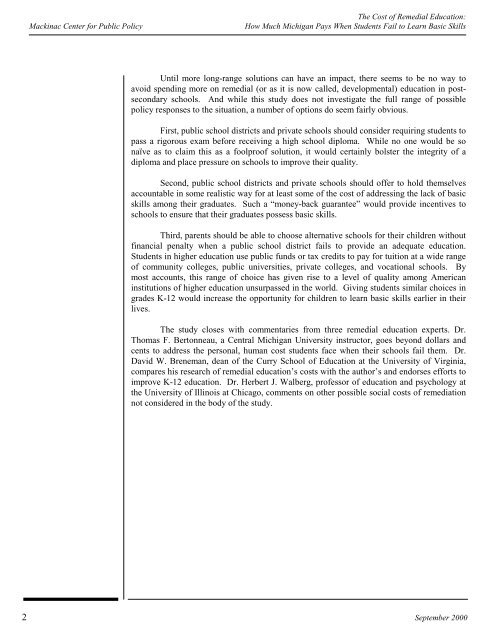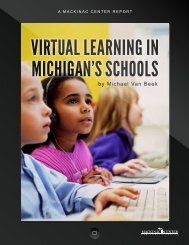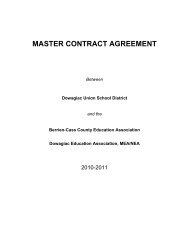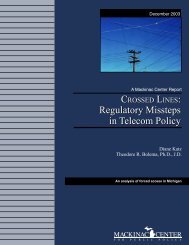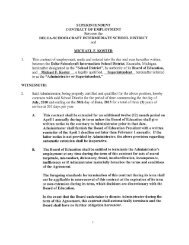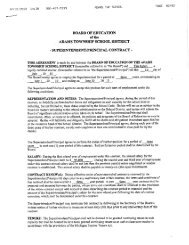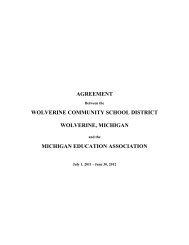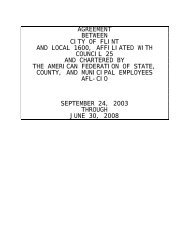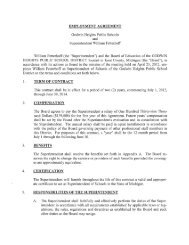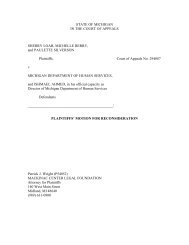The Cost of Remedial Education - Mackinac Center
The Cost of Remedial Education - Mackinac Center
The Cost of Remedial Education - Mackinac Center
Create successful ePaper yourself
Turn your PDF publications into a flip-book with our unique Google optimized e-Paper software.
<strong>The</strong> <strong>Cost</strong> <strong>of</strong> <strong>Remedial</strong> <strong>Education</strong>:<br />
<strong>Mackinac</strong> <strong>Center</strong> for Public Policy How Much Michigan Pays When Students Fail to Learn Basic Skills<br />
Until more long-range solutions can have an impact, there seems to be no way to<br />
avoid spending more on remedial (or as it is now called, developmental) education in postsecondary<br />
schools. And while this study does not investigate the full range <strong>of</strong> possible<br />
policy responses to the situation, a number <strong>of</strong> options do seem fairly obvious.<br />
First, public school districts and private schools should consider requiring students to<br />
pass a rigorous exam before receiving a high school diploma. While no one would be so<br />
naïve as to claim this as a foolpro<strong>of</strong> solution, it would certainly bolster the integrity <strong>of</strong> a<br />
diploma and place pressure on schools to improve their quality.<br />
Second, public school districts and private schools should <strong>of</strong>fer to hold themselves<br />
accountable in some realistic way for at least some <strong>of</strong> the cost <strong>of</strong> addressing the lack <strong>of</strong> basic<br />
skills among their graduates. Such a “money-back guarantee” would provide incentives to<br />
schools to ensure that their graduates possess basic skills.<br />
Third, parents should be able to choose alternative schools for their children without<br />
financial penalty when a public school district fails to provide an adequate education.<br />
Students in higher education use public funds or tax credits to pay for tuition at a wide range<br />
<strong>of</strong> community colleges, public universities, private colleges, and vocational schools. By<br />
most accounts, this range <strong>of</strong> choice has given rise to a level <strong>of</strong> quality among American<br />
institutions <strong>of</strong> higher education unsurpassed in the world. Giving students similar choices in<br />
grades K-12 would increase the opportunity for children to learn basic skills earlier in their<br />
lives.<br />
<strong>The</strong> study closes with commentaries from three remedial education experts. Dr.<br />
Thomas F. Bertonneau, a Central Michigan University instructor, goes beyond dollars and<br />
cents to address the personal, human cost students face when their schools fail them. Dr.<br />
David W. Breneman, dean <strong>of</strong> the Curry School <strong>of</strong> <strong>Education</strong> at the University <strong>of</strong> Virginia,<br />
compares his research <strong>of</strong> remedial education’s costs with the author’s and endorses efforts to<br />
improve K-12 education. Dr. Herbert J. Walberg, pr<strong>of</strong>essor <strong>of</strong> education and psychology at<br />
the University <strong>of</strong> Illinois at Chicago, comments on other possible social costs <strong>of</strong> remediation<br />
not considered in the body <strong>of</strong> the study.<br />
2 September 2000


